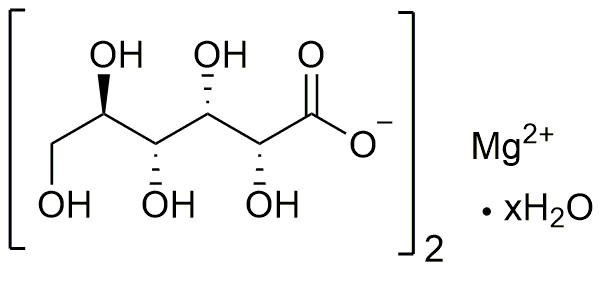Magnesium gluconate hydrate is widely utilized in research focused on:
- Dietary Supplements: This compound is commonly used in dietary supplements to provide magnesium, an essential mineral that supports various bodily functions, including muscle and nerve function, energy production, and bone health.
- Pharmaceuticals: It serves as an excipient in pharmaceutical formulations, enhancing the stability and bioavailability of active ingredients, making medications more effective.
- Food Industry: Magnesium gluconate is added to fortified foods and beverages, helping to increase magnesium intake in populations with dietary deficiencies.
- Cosmetics: In the cosmetics industry, it is used for its moisturizing properties and ability to improve skin texture, making it a popular ingredient in skincare products.
- Research Applications: Researchers utilize this compound in studies related to magnesium's role in cellular processes, exploring its potential benefits in areas such as cardiovascular health and metabolic disorders.
General Information
Properties
Safety and Regulations
Applications
Magnesium gluconate hydrate is widely utilized in research focused on:
- Dietary Supplements: This compound is commonly used in dietary supplements to provide magnesium, an essential mineral that supports various bodily functions, including muscle and nerve function, energy production, and bone health.
- Pharmaceuticals: It serves as an excipient in pharmaceutical formulations, enhancing the stability and bioavailability of active ingredients, making medications more effective.
- Food Industry: Magnesium gluconate is added to fortified foods and beverages, helping to increase magnesium intake in populations with dietary deficiencies.
- Cosmetics: In the cosmetics industry, it is used for its moisturizing properties and ability to improve skin texture, making it a popular ingredient in skincare products.
- Research Applications: Researchers utilize this compound in studies related to magnesium's role in cellular processes, exploring its potential benefits in areas such as cardiovascular health and metabolic disorders.
Documents
Safety Data Sheets (SDS)
The SDS provides comprehensive safety information on handling, storage, and disposal of the product.
Product Specification (PS)
The PS provides a comprehensive breakdown of the product’s properties, including chemical composition, physical state, purity, and storage requirements. It also details acceptable quality ranges and the product's intended applications.
Certificates of Analysis (COA)
Search for Certificates of Analysis (COA) by entering the products Lot Number. Lot and Batch Numbers can be found on a product’s label following the words ‘Lot’ or ‘Batch’.
Numéro de catalogue
Numéro de lot/série
Certificates Of Origin (COO)
This COO confirms the country where the product was manufactured, and also details the materials and components used in it and whether it is derived from natural, synthetic, or other specific sources. This certificate may be required for customs, trade, and regulatory compliance.
Numéro de catalogue
Numéro de lot/série
Safety Data Sheets (SDS)
The SDS provides comprehensive safety information on handling, storage, and disposal of the product.
DownloadProduct Specification (PS)
The PS provides a comprehensive breakdown of the product’s properties, including chemical composition, physical state, purity, and storage requirements. It also details acceptable quality ranges and the product's intended applications.
DownloadCertificates of Analysis (COA)
Search for Certificates of Analysis (COA) by entering the products Lot Number. Lot and Batch Numbers can be found on a product’s label following the words ‘Lot’ or ‘Batch’.
Numéro de catalogue
Numéro de lot/série
Certificates Of Origin (COO)
This COO confirms the country where the product was manufactured, and also details the materials and components used in it and whether it is derived from natural, synthetic, or other specific sources. This certificate may be required for customs, trade, and regulatory compliance.


